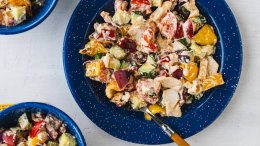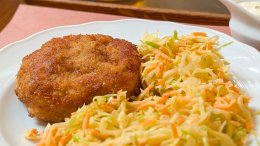Although culinary practices and techniques change and evolve, some ancestral methods and traditions have stood the test of time and remain optimal to this day. The production of corn tortillas through the process of nixtamalization is one of those traditions.
Nixtamalization is a laborious process during which corn is soaked and cooked in an alkaline solution, washed, hulled, and ground into a masa dough. This ancient tradition was integral to Mesoamerican cultures, such as the Aztec and Mayan, due to its superior nutritional attributes in comparison to raw corn.
In Victoria, chef Israel Alvarez is not only keeping the tradition alive, he’s found a way to fuse his cultural heritage with that of the local landscape. Since moving from Edmonton to Victoria, chef Alvarez has built strong relationships with farmers and producers in the region, and since launching MaiiZ earlier this summer, he’s been exclusively using organic B.C.-grown corn.
Popping up periodically at The Hive Eatery, MaiiZ produces nixtamal tortillas with a flavour, aroma, texture, and complexity that is lost when using industrialized methods that have become standardized in Western culinary culture.
We had a chance to sit down with the passionate Victoria-based chef, who shared his thoughts on MaiiZ and the nixtamalization process, the importance of preserving tradition, and why he’s chosen to use locally-sourced ingredients.
How did Maiiz come to be?
MAiiZ has been a dream of mine since 2016. At the time, I was working in Edmonton doing pop-ups under the name Comal Mexican Table Dinner. I was tired of working without passion and excitement, and wanted to work towards something.
I started nixtamalizing corn to share what defines Mexican cuisine, and the importance of nixtamalized corn as the foundation of my culture. That project didn’t take off the way I wanted in Edmonton. When I finally became a citizen, I made the decision to move to Vancouver Island to build my project in a new community.
After working at the Breakwater Tasting Room here in Victoria for four months, I brought the idea to the owners to build a nixtamal program at the restaurant. Their response was positive, and when the program started, we got a lot of attention for the unique experience I brought to Victoria.
Since leaving the Breakwater Tasting Room, the timing is right for me to have the support from my friends and the community to make this project happen and hopefully we will be successful in sharing the true nixtamal experience for more people to enjoy.
What sets nixtamal tortilla apart from other methods?
The major difference between nixtamal tortillas and other tortillas is the process used on the corn. When I make tortillas, I use dried organic corn kernels mixed with calcium hydroxide or slaked lime (a natural alkaline mineral) and water, boiling it, soaking it and grinding it to make a masa dough.
I use this dough fresh to make tortillas. However, with the industrial method, the masa is then dehydrated to make maseca flour. Using maseca flour is a night-and-day comparison. When the masa is over-processed like this, the texture, elasticity, and flavour are altered and you lose the integrity and soul of the corn. It’s like having instant coffee instead of a nice freshly ground espresso bean for your latte.
For me the tortillas made from maseca flour tarnish the memories I have of growing up in Mexico; the earthy aroma of fresh nixtamal is uniquely recognizable. Now, with the industrialization of maseca flour, the integrity of this process has been lost, and we are at risk of losing this significant ancient practice. The tortillas made from nixtamalized corn are more nutritional, they don’t fall apart as easily, maintain their structure, elasticity, and cultural integrity.
Can you explain what you mean by, “The foundation of a good higher quality food exists within the process?”
For me, the foundation of a good taco starts with a quality tortilla and this quality is achieved through the process of using organic corn and the traditional method of nixtamalization. This is the process that has been used since Mesoamerican civilizations invented it, and only since the 90s has it been manipulated by industrialization. In order to have convenience, quality has been compromised.
In North America, people don’t see Mexican food as a high-quality cuisine. It’s viewed through stereotypes and seen as a cheap take-out option; the dishes don’t usually resemble what is served in Mexico. If you look at any fine dining experience, the quality of food exists in how it is grown, processed, prepared and served. The same is true here.
I have recently been visiting farms in Saanich to see what they are growing and pick out the ingredients for my pop-up dinners. Being able to walk amongst the rows of growing vegetables, taste them fresh from the ground, and hearing the farmer talk about the process of growing is an experience I value. I want to respect the work that has gone into growing food, and using these ingredients grown with care adds quality to what I do.
Why are authenticity and strong relationships within the community important?
I love it here in B.C. People have been so supportive of my dream. We are enormously lucky to be on the island with such a strong sense of community, and the more people I’ve met since I moved here, the more connected I feel.
It’s important that people know where their food comes from; that they understand the work that goes into it and the value that it has. Having authenticity in the food I am cooking builds trust and transparency, and allows me to genuinely get to know the people I cook for. I like to have a connection with the people that I feed as well as the people that I work with. It’s why I do what I do, I want to feed people and make them happy.
The farmers and producers play an important role in what I do as well. Building a strong relationship with them allows me to be the link connecting the growers with the people that get to enjoy our work.
Why do you feel that it is important to source your corn from local farmers?
When COVID-19 hit, I realized my project and what I do was in danger because of global transportation delays. Having to rely on an imported product jeopardized the project and I wanted to explore the B.C. region. I was excited to find Fieldstone Organic, a B.C. supplier able to keep up with the volume I need, allowing me to bring these nixtamal tacos to people.
I am currently exploring relationships with other local farmers to grow the heirloom variety that I love. They work with Mexican farmers who have the tools and knowledge to cultivate heritage varieties in the way that is different from the process of growing corn on the cob. Using these foreign workers as sources of information will hopefully make them feel more included and connected to this community that they are joining. Beyond corn, I want to use my skills to showcase the amazing work of local farmers with techniques that are new and exciting to this region.
I have an opportunity to create a project that generates local jobs with less of an ecological footprint. To me, this feels like the right direction to take. In this time of crisis, I want to start something new and find a theme of connecting Mexican technique together with locally-sourced ingredients and support our community.













